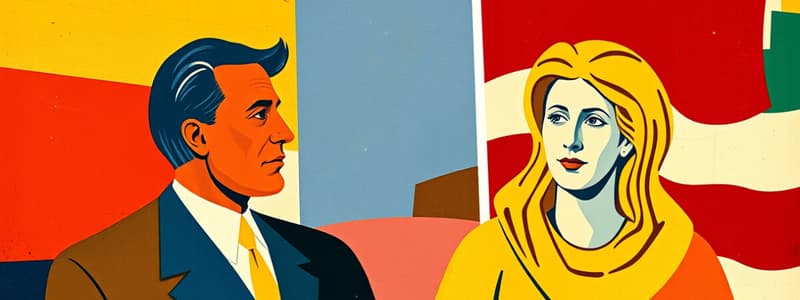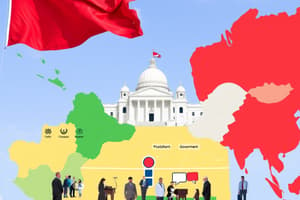Podcast
Questions and Answers
In a parliamentary system of representative democracy, who is the leader?
In a parliamentary system of representative democracy, who is the leader?
- The chancellor
- The president
- The majority party leader (correct)
- The prime minister
In the United States, who elects the legislature?
In the United States, who elects the legislature?
Citizens
Central and state governments influence each other in a ___ system.
Central and state governments influence each other in a ___ system.
federal
Which statement about communism is the most accurate?
Which statement about communism is the most accurate?
The two forms of democracy are ___ and ___.
The two forms of democracy are ___ and ___.
In a democracy, government gets its power from ___ what the majority of the citizens want.
In a democracy, government gets its power from ___ what the majority of the citizens want.
In a unitary system of government, local offices must follow decisions made by the ___ government.
In a unitary system of government, local offices must follow decisions made by the ___ government.
In which system of government would states function independently of each other?
In which system of government would states function independently of each other?
What is the main difference between federal and confederal systems of government?
What is the main difference between federal and confederal systems of government?
Which statement best defines a communist government?
Which statement best defines a communist government?
Flashcards are hidden until you start studying
Study Notes
Types of Governments
- In a parliamentary system, the prime minister is the leader of the majority party in the legislature.
- In the United States, legislative representatives are elected by citizens.
- Federal systems allow for central and state governments to influence one another.
- Communism is characterized by control exerted by party leaders over the economy and political life.
- Two primary forms of democracy exist: direct democracy, where citizens vote on laws directly, and representative democracy, where citizens elect representatives to make decisions on their behalf.
- In democratic systems, the government's power derives from the will of the majority of citizens.
- A unitary system mandates that local governmental decisions align with the central government’s directives.
- In a confederal system, states operate independently and hold significant power, often leading to a loose alliance among them.
- The key distinction between federal and confederal systems lies in authority: federal systems have centralized power, while confederal systems distribute power equally among state entities.
- A communist government is typically governed by a single political party, eliminating political pluralism.
Studying That Suits You
Use AI to generate personalized quizzes and flashcards to suit your learning preferences.




